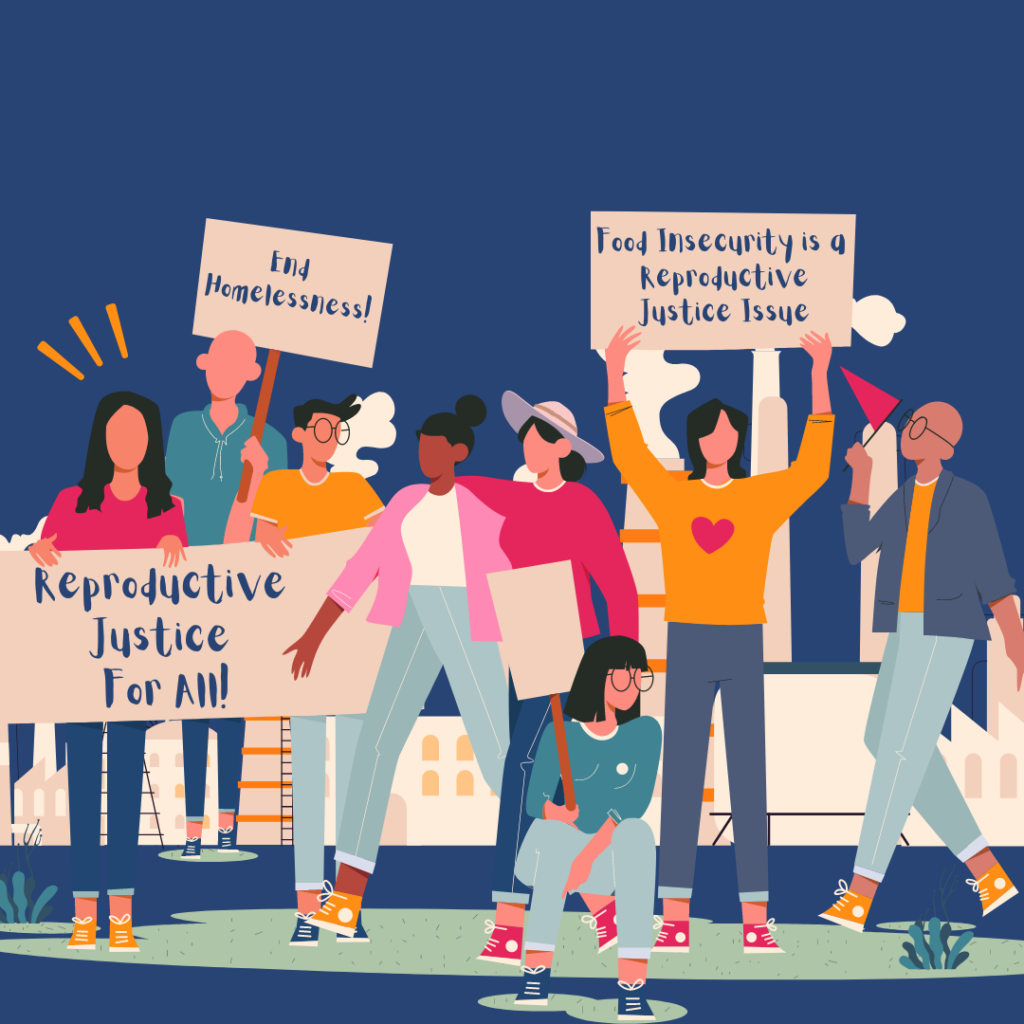
Since the overturning of Roe v Wade in 2022 and the upcoming election sparking discussions surrounding the future of bodily autonomy in the United States, the terms “Reproductive Justice” and “Reproductive Rights” have been used a lot in traditional media, social media, and in conversations with other people. Many may believe that these two terms are interchangeable and mean the same thing. While the movements behind these terms have a similar goal, there are key differences in what each movement seeks to accomplish.
Reproductive Rights refer to a person’s right to make decisions about their reproductive health. It ensures that people have the legal right to receive an abortion, fertility treatments, use contraceptives, and receive information on reproductive health. The Reproductive Rights movement in the United States dates to the early 1900s. According to History.com, in 1916, Magaret Sanger opened the country’s first birth control clinic – eventually becoming Planned Parenthood – in New York City. This was in response to the “Comstock Act” being passed by Congress 43 years prior, which made it illegal to “sell or distribute contraception across state lines.” The actual term began to be used by Women’s Rights Activists in the UN in the 1960s and 1970s. This prompted more advocacy for reproductive rights across the globe.
The creation of the term “Reproductive Justice” would come after several wins in the Reproductive Rights Movement, including the nationwide legalization of abortion in 1973. That is because in 1994, a group of Black women recognized that the Reproductive Rights movement didn’t address the intersecting issues that birthing people of color, LGBTQIA, people with low incomes, and people with disabilities face when it comes to making decisions regarding their reproductive health.
According to SisterSong, Reproductive Justice is defined as “the human right to maintain personal bodily autonomy, have children, not have children, and parent the children in safe and sustainable communities.” While Reproductive Rights addresses the legalization of reproductive choices, Reproductive Justice addresses the systemic barriers and inequities that affect marginalized communities. The Reproductive Justice framework recognizes that even when reproductive rights are legally protected, individuals from marginalized groups may still face significant challenges in accessing these services. Reproductive Justice emphasizes the need for a broader set of social and economic conditions that support not just the right to choose, but the actual ability to exercise that choice and to live a healthy, fulfilling life. This means addressing issues like poverty, healthcare access, and housing, which can all impact an individual’s ability to make and act on reproductive choices.
We know that reproductive injustice is not felt equitably by all people, and EverThrive IL strives to achieve reproductive justice for all people and families—especially those in Black, Brown, Indigenous, and LGBTQIA communities. We work to ensure they have the access, resources, and health care necessary to create and sustain healthy families on their own terms. We do this through community-driven partnerships, policy action, and system change.
Our Reproductive Justice work has achieved real results that impact the lives of Illinoisans every day.
For example:
- We advocated successfully for Illinois to make doula care without cost-sharing a required benefit for Medicaid and private insurance in Illinois—ensuring these life-saving birth workers can support birthing people regardless of their income. Doulas are trained to advocate and provide support for their patients before, during and after birth. This support can be the difference between life and death for marginalized groups.
- We developed The Gathering, a digital public education campaign to help Black pregnant people understand how to care for themselves during and after pregnancy. We also provide tools to identify and respond to bias in their care. This information has been distributed to 40,000 Black individuals of childbearing age across Chicago.
- We convene 3 Community Alignment Boards (CABs) for Family Connects Chicago (FCC), a universal postpartum nurse home visiting program. These CABs aim to align resources for families enrolled in the program, improve our current maternal, infant, and child health systems in Chicago, strengthen collaboration amongst social service and medical providers, and advocate for effective policy changes. We want
Overall, reproductive justice is about creating a world where everyone has the right to make informed choices about their reproductive lives and where systemic barriers do not dictate the possibilities available to them. EverThrive IL envisions a future in which every Illinoisan has the health care and support necessary to determine if, when, and how to become a parent—safely and in a sustainable community.
